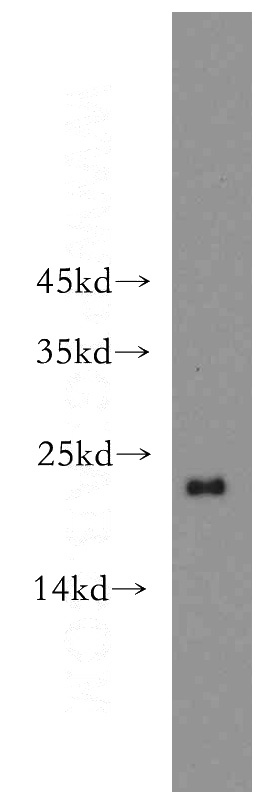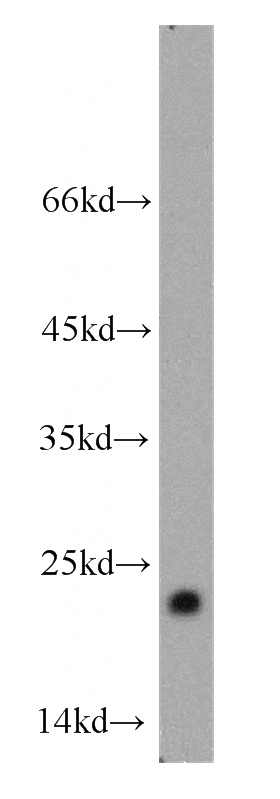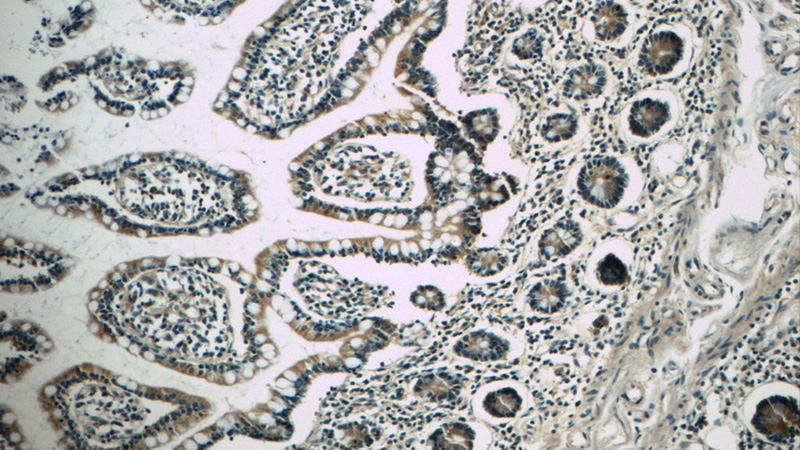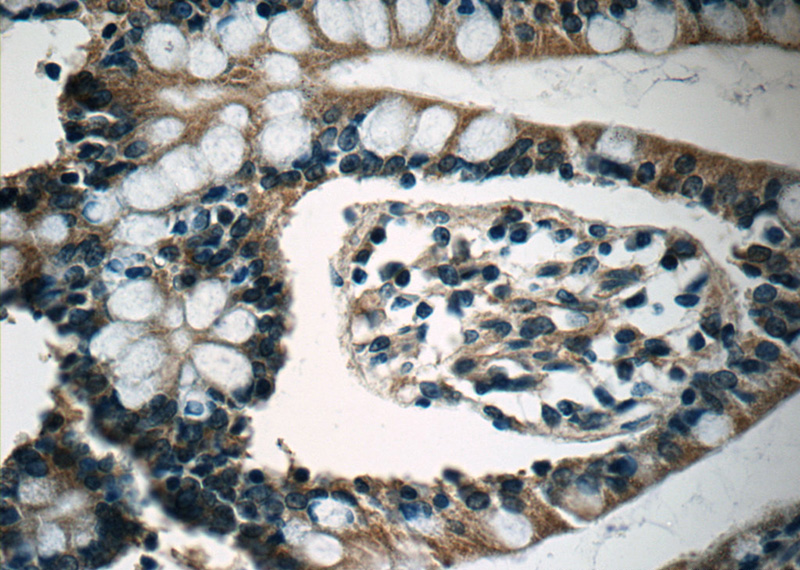-
Product Name
ARF1 antibody
- Documents
-
Description
ARF1 Rabbit Polyclonal antibody. Positive IHC detected in human small intestine tissue, human lung cancer tissue, human stomach cancer tissue. Positive WB detected in HeLa cells, COS-7 cells, HEK-293 cells, mouse brain tissue. Observed molecular weight by Western-blot: 21 kDa
-
Tested applications
ELISA, WB, IHC
-
Species reactivity
Human,Mouse,Rat, Monkey; other species not tested.
-
Alternative names
ADP ribosylation factor 1 antibody; ARF1 antibody
-
Isotype
Rabbit IgG
-
Preparation
This antibody was obtained by immunization of ARF1 recombinant protein (Accession Number: NM_001658). Purification method: Antigen affinity purified.
-
Clonality
Polyclonal
-
Formulation
PBS with 0.1% sodium azide and 50% glycerol pH 7.3.
-
Storage instructions
Store at -20℃. DO NOT ALIQUOT
-
Applications
Recommended Dilution:
WB: 1:200-1:2000
IHC: 1:20-1:200
-
Validations

HeLa cells were subjected to SDS PAGE followed by western blot with Catalog No:108242(ARF1 antibody) at dilution of 1:500

mouse brain tissue were subjected to SDS PAGE followed by western blot with Catalog No:108242(ARF1 antibody) at dilution of 1:500

Immunohistochemistry of paraffin-embedded human small intestine tissue slide using Catalog No:108242(ARF1 Antibody) at dilution of 1:50 (under 10x lens)

Immunohistochemistry of paraffin-embedded human small intestine tissue slide using Catalog No:108242(ARF1 Antibody) at dilution of 1:50 (under 40x lens)
-
Background
ADP-ribosylation factors (ARFs) are members of the ARF family of GTP-binding proteins of the Ras superfamily, with 20kda protein size. ARFs bind and regulate GTP/GDP cycle by alternating between the active GTP-bound and inactive GDP-bound conformations. ARF family proteins are essential and ubiquitous in eukaryotes. Six highly conserved members of the family have been identified in mammalian cells. They function in vesicular traffic and actin remodelling and other bioprocesses in cells. The ARF1 protein is localized to the Golgi apparatus and has a central role in intra-Golgi transport. It mainly functions in coat recruitment. (PMID: 7759471, PMID: 16042562).This antibody can bind ARFs for the close sequences.
-
References
- Lewis-Saravalli S, Campbell S, Claing A. ARF1 controls Rac1 signaling to regulate migration of MDA-MB-231 invasive breast cancer cells. Cellular signalling. 25(9):1813-9. 2013.
- Schlienger S, Campbell S, Claing A. ARF1 regulates the Rho/MLC pathway to control EGF-dependent breast cancer cell invasion. Molecular biology of the cell. 25(1):17-29. 2014.
- Haines E, Schlienger S, Claing A. The small GTPase ADP-Ribosylation Factor 1 mediates the sensitivity of triple negative breast cancer cells to EGFR tyrosine kinase inhibitors. Cancer biology & therapy. 16(10):1535-47. 2015.
- Haines E, Saucier C, Claing A. The adaptor proteins p66Shc and Grb2 regulate the activation of the GTPases ARF1 and ARF6 in invasive breast cancer cells. The Journal of biological chemistry. 289(9):5687-703. 2014.
- Lee S, Uchida Y, Wang J. Transport through recycling endosomes requires EHD1 recruitment by a phosphatidylserine translocase. The EMBO journal. 34(5):669-88. 2015.
Related Products / Services
Please note: All products are "FOR RESEARCH USE ONLY AND ARE NOT INTENDED FOR DIAGNOSTIC OR THERAPEUTIC USE"
